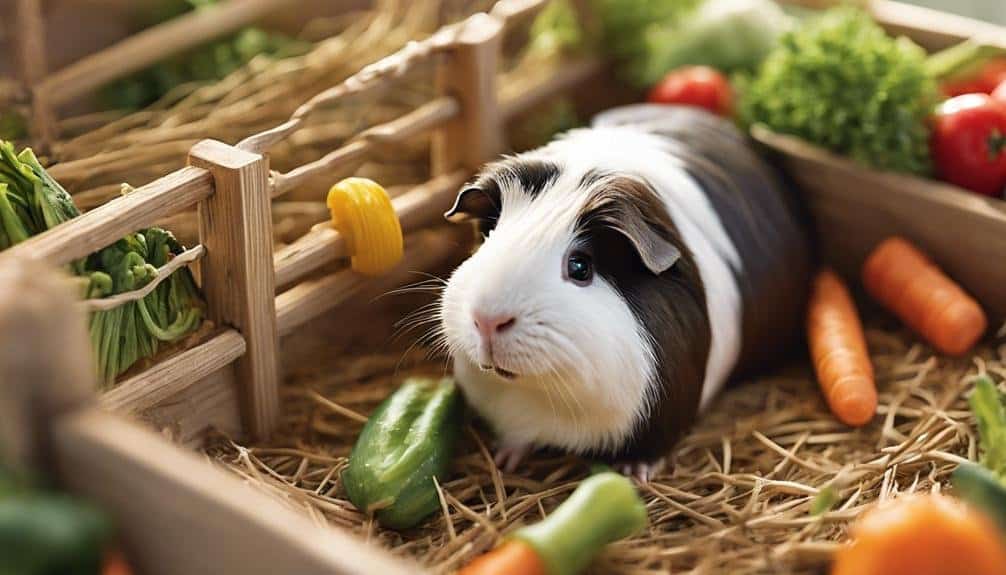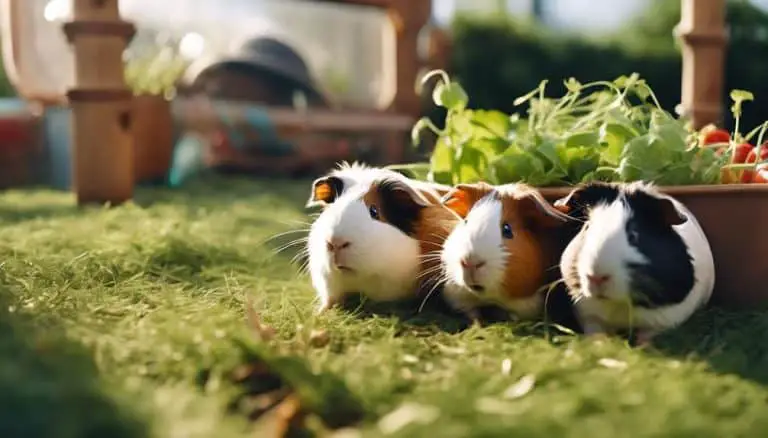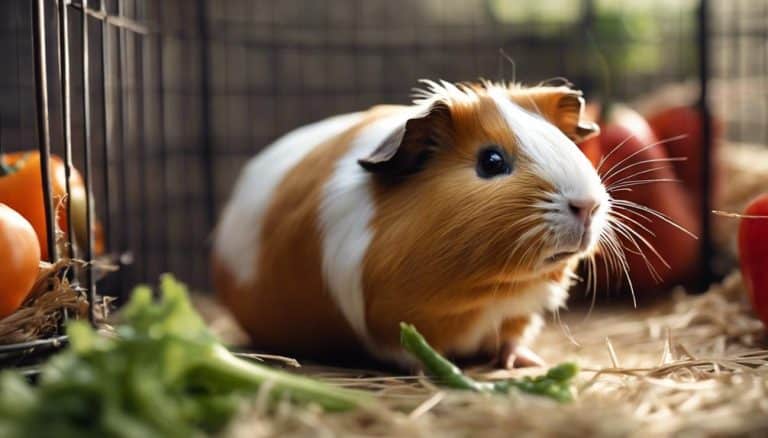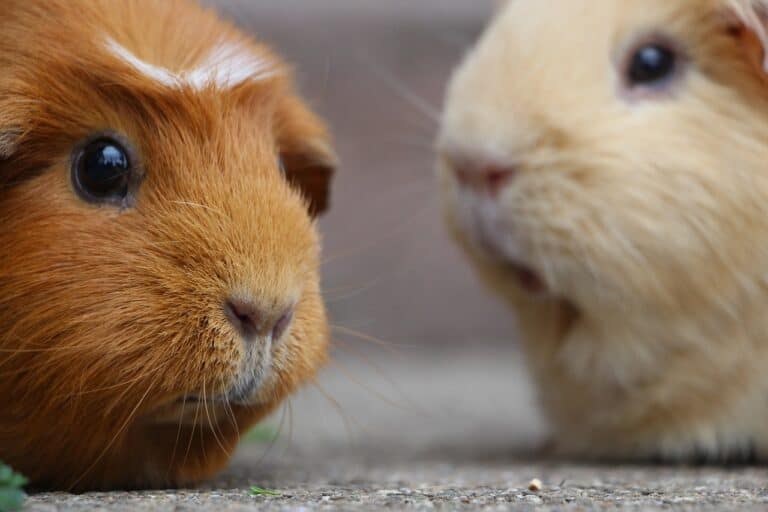How to Care for Guinea Pigs: Rodents 101
Ever wondered what it takes to provide top-notch care for our guinea pig pals?
Well, let’s start by peeling back the layers of their needs and behaviors.
From creating the perfect habitat to mastering their dietary essentials, there’s a whole world of knowledge awaiting us.
So, are you ready to uncover the secrets to keeping these adorable rodents content and healthy in your home?
Let’s explore the ins and outs of guinea pig care together.
Guinea Pig Habitat Requirements
When setting up a habitat for guinea pigs, it’s crucial to ensure that they’ve a minimum of 7.5 square feet per pig to thrive in optimal living conditions. Guinea pigs need ample space to move around, exercise, and exhibit their natural behaviors. Providing a spacious habitat is essential for their well-being.
In addition to the size requirement, the bedding in the guinea pig habitat plays a vital role in maintaining cleanliness. Opt for absorbent materials like fleece or paper-based bedding to ensure a comfortable and hygienic environment for your furry companions. Regularly cleaning and changing the bedding is necessary to prevent health problems and promote good hygiene practices.
To enhance their living space, incorporate hiding spots, tunnels, and platforms for enrichment. These additions offer guinea pigs opportunities for exploration and play, which are essential for their mental and physical stimulation. Proper ventilation is also crucial to prevent respiratory issues in guinea pigs, ensuring they breathe fresh, clean air.
Essential Guinea Pig Diet
Ensuring a balanced and nutritious diet is essential for the overall health and well-being of guinea pigs, complementing their habitat requirements for a thriving living environment. Guinea pigs need a diet high in hay to support their digestion and dental health.
Fresh vegetables are crucial for providing vitamin C, a nutrient vital for guinea pigs as they can’t produce it themselves. When it comes to pellets, it’s important to limit their intake to prevent obesity and ensure a balanced diet.
While fruits can be a tasty treat, they should only be given occasionally, about once a week, to prevent any potential health issues. Additionally, fresh grass can be gradually introduced into a guinea pig’s diet to avoid digestive upsets and provide enrichment.
Proper Guinea Pig Grooming

To maintain your guinea pig’s health and well-being, regular grooming, including nail trimming, is essential for preventing potential injuries and ensuring their comfort. Here are some tips for proper guinea pig grooming:
- Assist with Grooming: While guinea pigs groom themselves, long-haired breeds may need occasional assistance to prevent mats and tangles.
- Nail Trimming: Regularly trim your guinea pig’s nails to avoid overgrowth. Use specialized guinea pig nail scissors with caution to prevent cutting the quick and causing bleeding.
- Professional Services: If you’re unsure about trimming your guinea pig’s nails, consider professional grooming services for safe and proper nail care.
- Educate Yourself: Watch informative videos or seek guidance from experienced guinea pig owners to learn the correct techniques for grooming and nail care. Being informed will help you confidently care for your furry friend’s grooming needs.
Handling and Socializing Guinea Pigs
As we continue our journey in caring for these delightful pets, let’s now explore the crucial aspect of handling and socializing guinea pigs to foster a strong bond and ensure their well-being. Guinea pigs should always be handled gently and calmly to build trust and prevent stress. Socialization plays a vital role in their well-being, so make sure to spend quality time interacting with them daily. Providing hiding spots and tunnels in their habitat can offer security and enrichment for socialization activities.
When handling guinea pigs, it’s essential to avoid sudden movements or loud noises to maintain their comfort and trust. By monitoring them regularly for signs of stress or illness during interactions, you can address any issues promptly. This proactive approach ensures that your guinea pigs are happy and healthy companions. Remember, creating a safe and nurturing environment for them to socialize and interact with you is key to developing a strong bond that will last a lifetime.
Health Monitoring for Guinea Pigs

Regularly monitoring the health of your guinea pig is essential to ensure they’re thriving and happy in your care. Here are some key aspects to focus on when it comes to keeping your guinea pig healthy:
- Weight Monitoring: Regularly weigh your guinea pig to track any fluctuations that could indicate health issues, such as weight loss or obesity.
- Appetite Changes: Keep a close eye on your pet guinea pig’s eating habits; sudden changes could signal underlying problems that need attention.
- Fur Health: Check your guinea pig’s fur for any abnormalities like matting, bald patches, or signs of parasites like mites or lice that could affect their well-being.
- Respiratory Health: Watch for symptoms of respiratory distress such as wheezing, coughing, or labored breathing, as issues in the respiratory tracts can impact your guinea pig’s overall health.
Conclusion
In conclusion, caring for guinea pigs requires dedication and knowledge. By providing a spacious habitat, a balanced diet, regular grooming, and social interaction, we can ensure our furry friends lead happy and healthy lives.
Monitoring their health and seeking veterinary care when needed is essential for their well-being. With proper care and attention, guinea pigs can thrive and bring joy to our lives for years to come.
Let’s continue to learn and grow alongside these wonderful rodents.







